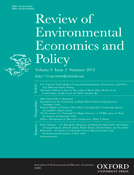
Review of Environmental Economics and Policy
Scope & Guideline
Empowering Policy Through Interdisciplinary Insights
Introduction
Aims and Scopes
- Environmental Economics Analysis:
The journal emphasizes rigorous economic analysis related to environmental issues, including the valuation of natural resources, the cost-effectiveness of environmental policies, and the economic impacts of environmental degradation. - Policy Evaluation and Development:
A core aim of the journal is to evaluate existing environmental policies and propose new policy frameworks that enhance sustainability and economic efficiency. This includes assessing the effectiveness of regulations and market-based approaches. - Interdisciplinary Approaches:
It encourages interdisciplinary research that blends economics with other fields, such as public health, ecology, and social sciences, to provide holistic insights into environmental challenges. - Global and Local Perspectives:
The journal covers both global and localized environmental issues, offering analyses that are relevant across different geographical contexts, from developed to developing nations. - Focus on Climate Change:
The journal consistently addresses climate change economics, exploring adaptation and mitigation strategies, the economic implications of carbon pricing, and the transition to a low-carbon economy.
Trending and Emerging
- Environmental Justice and Equity:
There is a surge in papers addressing environmental justice, focusing on the disparities caused by environmental policies and their impacts on marginalized communities, highlighting the need for equitable solutions. - Climate Change Adaptation and Mitigation Strategies:
Research centered on innovative strategies for climate change adaptation and mitigation is increasingly prominent, emphasizing the economic implications of transitioning to sustainable practices. - Health and Environmental Interconnections:
Emerging studies are increasingly linking environmental issues with public health outcomes, particularly concerning pollutants such as lead and their long-term effects on vulnerable populations. - Technological Innovations in Energy:
There is a growing focus on the economics of new energy technologies, including electric vehicles and renewable energy sources, reflecting the urgency of transitioning to sustainable energy systems. - Geospatial Analysis in Environmental Research:
The application of geospatial methods to analyze environmental issues and policies is gaining traction, providing more nuanced insights into spatial dynamics and policy effectiveness.
Declining or Waning
- Traditional Resource Economics:
Research focused on traditional aspects of resource economics, such as classical extraction and allocation models, has decreased in favor of more integrative and contemporary approaches that consider sustainability and environmental justice. - Generalized Agricultural Economics:
While agriculture remains a vital topic, the specific focus on generalized agricultural economics without a clear link to environmental impacts has waned, as the journal increasingly emphasizes sustainable practices and the economic consequences of agricultural policies. - Single-Dimensional Environmental Policies:
The exploration of single-dimensional environmental policies, such as isolated pollution control measures, appears to be declining. There is a growing preference for research that integrates multiple dimensions of environmental and economic interactions. - Static Economic Models:
The use of static economic models that do not account for dynamic ecological feedbacks or changes over time is less prominent, as there is a trend towards more adaptive and responsive modeling approaches. - Historical Environmental Policy Analysis:
While historical analyses still hold value, there is a noticeable shift towards contemporary issues and future-oriented research, leading to a decrease in studies that focus solely on historical perspectives.
Similar Journals

Water Economics and Policy
Exploring the Nexus of Water, Economics, and PolicyWater Economics and Policy is a leading academic journal specializing in the interdisciplinary examination of water-related economic issues and policy frameworks. Published by WORLD SCIENTIFIC PUBL CO PTE LTD in Singapore, this journal serves as a pivotal platform for sharing innovative research, empirical studies, and theoretical developments that address the complex interactions between water resources management, economic sustainability, and policy formulation. With its impact factor reflecting its growing influence in the field, Water Economics and Policy is indexed in several key categories, ranking in the third quartile in areas such as Business and International Management, Economics and Econometrics, and Water Science and Technology. Launched in 2015, the journal embraces an open-access approach to enhance the dissemination of knowledge and insights among researchers, policymakers, and practitioners. Its commitment to fostering dialogue on critical water issues makes it an invaluable resource for anyone seeking to advance their understanding of water economics and contribute to the sustainable management of water resources.

Journal of Australian Political Economy
Exploring the intersections of society and economy.Journal of Australian Political Economy, published by the Australian Political Economy Movement, serves as a crucial platform for interdisciplinary scholarship in the realms of political economy, sociology, and economics. With an ISSN of 0156-5826 and an E-ISSN of 1839-3675, this esteemed journal is known for its rigorous peer-reviewed articles that contribute to the understanding of economic issues and their sociopolitical contexts in Australia and beyond. Indexed in Scopus, it holds impressive quartile rankings—Q2 in Sociology and Political Science and Q3 in Economics and Econometrics—demonstrating its relevance and impact within the academic community. The journal's emphasis on qualitative and quantitative analyses encourages researchers to explore critical themes that shape societal structures and economic policies, making it an essential resource for students, scholars, and professionals aiming to deepen their understanding of political economy. With a convergence period from 2008 to 2024, the Journal of Australian Political Economy continues to forge new paths in scholarly discourse and provide cutting-edge insights into pressing societal issues.

Revista Economia
Leading the Way in Economic Research and PolicyRevista Economia is a reputable academic journal published by PONTIFICIA UNIV CATOLICA PERU, dedicated to advancing knowledge in the field of economics. With an impact factor that reflects its substantial contribution to economic research, the journal has been an Open Access platform since its inception in 1977, facilitating widespread dissemination of scholarly work. Located in Lima, Peru, and serving a global audience, Revista Economia invites researchers, professionals, and students to explore a diverse range of topics related to economic theory, policy analysis, and applied economics. Its commitment to rigorous peer review ensures the publication of high-quality, impactful research, making it an essential resource for those seeking to deepen their understanding of economic issues and trends. The journal's ISSN (0254-4415) and E-ISSN (2304-4306) provide easy access to its vast repository of articles, further enhancing its stature within the academic community.

Island Studies Journal
Fostering Understanding of Island EcosystemsIsland Studies Journal, published in Denmark, is a leading open-access journal since 2006 that focuses on the unique challenges and opportunities faced by islands and coastal regions worldwide. With an E-ISSN of 1715-2593, this journal uniquely spans several disciplines, making it highly relevant within the realms of Geography, Planning and Development, Political Science, and Sociology. Demonstrating exceptional impact, it holds a prestigious Q1 ranking across these fields, reflecting its influence and commitment to advancing scholarly discourse. The journal's Scopus rankings further underscore its significance, with notable positions in the Social Sciences category, including a commendable 87th rank in Political Science and International Relations. Through rigorously peer-reviewed articles and innovative research contributions, the Island Studies Journal aims to foster a comprehensive understanding of island dynamics, environmental sustainability, and socio-political contexts. It serves as an essential resource for researchers, professionals, and students seeking to deepen their knowledge in the fields of island studies and related disciplines.
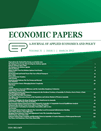
Economic Papers
Elevating Understanding of Economic Dynamics.Economic Papers is a prestigious journal published by WILEY, recognized for its contributions to the fields of economics, econometrics, and finance since its inception in 1982. With an impressive impact factor reflecting its scholarly influence, this journal is ranked in the Q2 category in the Economics, Econometrics, and Finance sector, placing it among the top 30% of journals in the field. The journal aims to disseminate high-quality research that addresses contemporary economic challenges, thereby advancing both theoretical understanding and practical applications. While currently not available as open access, Economic Papers provides vital insights for researchers, professionals, and students striving to deepen their comprehension of economic dynamics and contribute to sound policy-making. Scholars are encouraged to submit their work to engage with a robust academic community and impact the discourse in economic research.
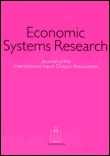
Economic Systems Research
Unraveling Complexities, Shaping FuturesEconomic Systems Research, an esteemed journal published by Routledge Journals, Taylor & Francis Ltd, is a pivotal platform within the field of economics and econometrics, focusing on the complexities of economic systems and their interactions. Established in 1989, it has maintained a robust publication cadence, converging towards 2024, and has earned a notable standing with a 2023 Scopus ranking placing it in the 79th percentile among its peers, categorized as Q2 in the competitive landscape of Economics and Econometrics. This distinction underscores its impact and relevance in disseminating quality research. With a commitment to advancing the understanding of economic dynamics, the journal serves as a vital resource for researchers, professionals, and students seeking to explore innovative frameworks and empirical analyses within economic systems. Although it offers traditional subscription access, the journal's wealth of knowledge is crucial for those keen on contributing to and staying abreast of the latest developments in the discipline.
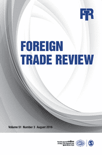
Foreign Trade Review
Exploring the Dynamics of Global TradeForeign Trade Review, published by SAGE Publications India Pvt Ltd, represents a pivotal platform for scholarly discourse in the realms of International Trade, Business, and Economics. With an ISSN of 0015-7325 and E-ISSN 0971-7625, this esteemed journal has been serving the academic community since 1966, and continues to influence thought leadership in its converged years through 2024. As a leader in its field, it holds a respectable Q2 ranking in both Business and International Management and Economics, Econometrics and Finance, alongside a Q3 ranking in Marketing for 2023. The Scopus ranking further cements its noteworthy position, placed within the 68th percentile for general economics and 45th percentile for business management. Although the journal does not offer open access, it is invaluable for researchers, professionals, and students who seek to enrich their understanding of foreign trade dynamics and their implications. The contributions made in this journal not only support academic rigor but also enhance practical applications of trade policies and international economic strategies.

Journal of Climate Change
Advancing knowledge for a sustainable future.The Journal of Climate Change, published by IOS PRESS, is a premier academic platform dedicated to the multidisciplinary investigation of climate change, its impacts, and mitigation strategies. With a focus on promoting innovative research, this journal aims to cultivate dialogue among researchers, policymakers, and environmental professionals globally. While the impact factor signifies its academic significance, the journal prides itself on providing unrestricted access to cutting-edge research insights, fostering collaboration within the scientific community. The journal’s ISSN is 2395-7611, and the E-ISSN is 2395-7697. Whether you are a seasoned researcher or a student exploring the critical implications of climate change, the Journal of Climate Change serves as an essential resource for the latest findings and discussions in this vital field.

International Environmental Agreements-Politics Law and Economics
Exploring the nexus of politics, law, and economics in environmental agreements.International Environmental Agreements-Politics Law and Economics, published by SPRINGER, is a leading journal dedicated to exploring the intersection of economics, law, and political science as they relate to international environmental agreements. With impressively high rankings in its respective categories—Q1 in Economics and Econometrics, Law, and Political Science and International Relations—this journal serves as a critical platform for rigorous scholarly discourse, addressing pressing global challenges and fostering understanding among policymakers and academics alike. The journal is indexed with an E-ISSN of 1573-1553 and maintains a strong presence in Scopus, excelling in multiple disciplines (ranked #40 in Law, #39 in Political Science, and #128 in Economics). Despite being a subscription-based journal, its comprehensive analyses and innovative perspectives make it an invaluable resource for researchers, professionals, and students committed to advancing sustainable environmental governance. Established in 2003, the journal continues to contribute to the field with engaging content that encourages interdisciplinary collaboration and furthers the study of international environmental treaties.
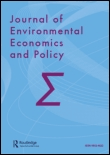
Journal of Environmental Economics and Policy
Advancing Policies for a Greener TomorrowThe Journal of Environmental Economics and Policy, published by Routledge Journals, Taylor & Francis Ltd, serves as a premier platform for researchers, policymakers, and scholars focused on the interlinkages between environmental issues and economic principles. With an ISSN of 2160-6544 and an E-ISSN of 2160-6552, this esteemed journal has achieved a commendable positioning in the academic community, securing a Q2 rating in key fields such as Economics and Econometrics, Environmental Science, and Management, Monitoring, Policy, and Law as of 2023. The journal has consistently been ranked in the upper tiers of its categories, reflecting its impact and relevance in contemporary environmental discussions. Operating from the United Kingdom, this journal is dedicated to publishing high-quality research articles, reviews, and case studies that contribute to the understanding of economic strategies in environmental governance and policy-making. With an address at 2-4 Park Square, Milton Park, Abingdon OX14 4RN, Oxon, England, it invites contributions that address pressing ecological challenges through an economic lens, fostering an interdisciplinary dialogue crucial for sustainable development. Although not an open access journal, it remains influential in shaping policies and practices that align economic growth with environmental sustainability.